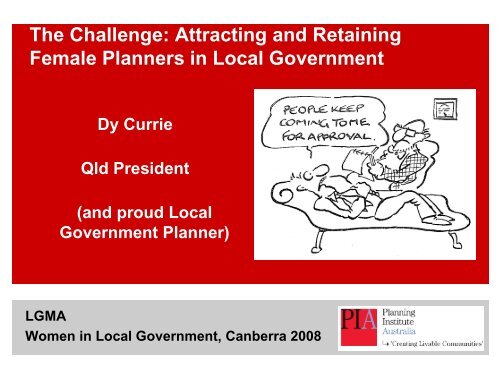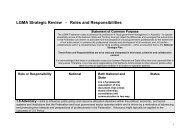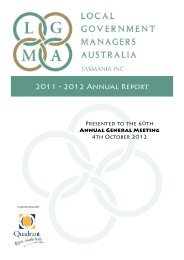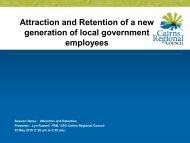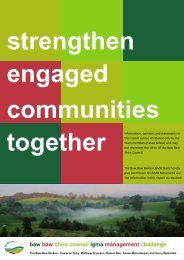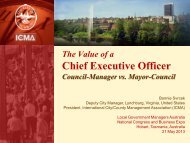Dyan.Currie - Local Government Managers Australia
Dyan.Currie - Local Government Managers Australia
Dyan.Currie - Local Government Managers Australia
Create successful ePaper yourself
Turn your PDF publications into a flip-book with our unique Google optimized e-Paper software.
The Challenge: Attracting and Retaining<br />
Female Planners in <strong>Local</strong> <strong>Government</strong><br />
Dy <strong>Currie</strong><br />
Qld President<br />
(and proud <strong>Local</strong><br />
<strong>Government</strong> Planner)<br />
LGMA<br />
Women in <strong>Local</strong> <strong>Government</strong>, Canberra 2008
Multiple hats<br />
• PIA State President<br />
• Chair SEQ DA Forum<br />
• <strong>Local</strong> <strong>Government</strong><br />
Planner
Inquiry into Planning Education & Employment<br />
• 2003/04 PIA conducted a National Inquiry into Planning Education<br />
and Employment.<br />
• Testing of anecdotal evidence:<br />
– There was a dire shortage of planning professionals<br />
– The number of planning graduates was in decline<br />
– Skills did not necessarily match workplace needs
Warning Bells<br />
<strong>Local</strong> government planners were under particular pressure:<br />
– High stress levels and low morale<br />
– Unmanageable workloads<br />
– Being understaffed<br />
– Lack of awareness of the seriousness of the<br />
issue<br />
– Ethical dilemmas and concerns about quality<br />
being compromised<br />
• But equally there was strong support:<br />
– From employers wanting to improve<br />
– For mentoring/supporting professionals and<br />
young planners
Have things changes since 2004?<br />
• The statistics remain remarkably similar:<br />
- About 12,000 planners in market place<br />
– 47% in <strong>Local</strong> <strong>Government</strong> (30% private & 22% state) –<br />
– Vacancy rates of 13 – 19%– no real change in supply despite efforts<br />
– Demand expected to increase by 28% (over 5 – 10 years)<br />
– Around 46% of profession under 35 years of age<br />
– 1 in 4 women work part-time compared to 1 in 10 men<br />
– Around 5% of female professionals over 35 have left planning<br />
– Around 40% of employers have engaged planning assistants<br />
– Salaries are growing faster than CPI
Is local government worse off than other sectors?<br />
– Was the most critical shortage in 2004 – unchanged<br />
– Critical shortage exists in most areas – major cities and regional<br />
areas<br />
– Longer term shortages exist in rural and regional areas due to the<br />
difficulty in attracting/retaining staff<br />
– ‘Sea-change’ communities are badly affected due to volumes of work<br />
– Key problem of professional “leakage” to alternative roles<br />
(particularly women)
Why is local government losing planners?<br />
– Volume of work and new &/or complex legislation<br />
– Skills transferrable to non-planning roles<br />
– Planners don’t want to work in rural/regional areas<br />
– Demand has pushed salaries beyond local<br />
government’s reach<br />
– Overseas demand<br />
– Women leaving for work choice/family reasons<br />
(not Qld)<br />
– Unacceptable work environments – conflict,<br />
ethics, workload, lack of flexibility, work/life<br />
balance (particularly women)
So what can local government do?<br />
• Planners nationally tell us that what they want in the workplace is:<br />
– Reduced workplace conflict and “toxicity”<br />
– Respect for their professional opinions and advice<br />
– Flexible conditions and part time work opportunities<br />
– Stronger internal support –induction, team building, mentoring, training<br />
– Identifiable career paths and encouragement to progress in local govt<br />
– Confidential help with ethical issues
How do you become an employer of choice?<br />
– Active support for training and development<br />
– Formal Codes of Conduct<br />
– Clearer planning schemes/strategy/policies<br />
– Recognition of professional status – senior<br />
job descriptions requiring CPP status<br />
– DAF leading practice<br />
– eDA<br />
– Avoiding blame
DA – The Inside View (SA Study, Dec 2007)<br />
• DA resourcing and trends<br />
• Planners occupied around 40% of staff positions in DA teams<br />
•<br />
• 36% of planner positions fell vacant, but only 15% of support positions<br />
• This means the entire DA planning population turning over every 3 years<br />
• 43% moved to other Councils, 15% went to private practice & 10% to state<br />
govt and 22% left the system altogether!<br />
• Vacancies were often filled by staff less experienced than desired<br />
• 20% of vacancies were not filled leading to backlogs<br />
• Payment above award or beyond experience level is commonplace
The Inside View – What needs to Change?<br />
• Improved information for applicants<br />
• Support /tech staff crucial<br />
• Streamlining of minor assessments etc<br />
• Complexity and stakeholder tension<br />
• Cost recovery from the DA process low<br />
• Stabilise the workforce - bonuses, flexibility,<br />
salary increases, faster career pathing,<br />
greater resources and increase support<br />
staff ratios<br />
• Optimise the use of IT as a process<br />
management and reporting tool
Qld Case study<br />
• 60% Councils shortage of DA planners<br />
• 49% Councils shortage of Strategic planners<br />
• Skills shortage in Qld worse than 2004 survey due to unprecedented<br />
growth, migration from south and number of applications<br />
Attraction and Retention survey 07 showed<br />
• Clear loss of females at 5 and 10 years experience<br />
• 49% with high to very high stress levels (councils and consultancies)<br />
• 44% have considered leaving profession<br />
• Females not leaving in Qld due to have children
What do planners in Qld like and dislike?<br />
Like<br />
• Variety<br />
• Colleagues<br />
• Ability to make a<br />
difference<br />
Dislike<br />
• High workload<br />
• Low Salaries<br />
• Level of political<br />
interference<br />
• State policy - IPA
Qld Recommendations<br />
21 Recommendations including<br />
• Professional development programs<br />
• Design jobs for a variety of work – DA/Strategic/State/<strong>Local</strong><br />
• Retention Strategy targetting planners 21-29 years old – in particular<br />
female DA planners<br />
• Stress management program – workload and burnout<br />
• Flexibility, part-time etc
PIA action on the work environment<br />
• Advocating for e-DA including additional commonwealth/state $$<br />
• Encouraging elected representative training<br />
• Promoting Codes of Conduct in the workplace<br />
• Providing ethics advice (Ethi-call: St James Ethics Centre)<br />
• Supporting de-politicising of decision making through panels (SA)<br />
• ^ the professional competencies and standing of planners (CPP)<br />
• Raising profile with government, the community and within industry<br />
• National Education committee
PIA support for DA reform and increased supply<br />
• National President chaired DAF for the past 2 years and DAF<br />
endorsed as preferred system<br />
• Strongly support the e-DA agenda<br />
• Highlighting SA planning panels as leading practice<br />
• Part of Reform processes in NSW, Qld, SA and Vic<br />
• Providing immigration advice to overseas planners<br />
• Working with Universities to increase places<br />
• Introducing cadetships, traineeships and Cert IV courses
PIA’s actions - Improving professional standing<br />
• Increasing the professionalism of the profession<br />
• Improving the profession’s commitment to professional development<br />
and lifelong learning<br />
• Improving professional standards through the introduction of CPP<br />
(mandatory PD and competency assessing)<br />
• Matching skill gaps identified by the Inquiry with appropriate PIA<br />
provided or sponsored training programs<br />
• National Education Committee bringing together Planning Educators<br />
and Practitioners to review course accreditation and advisory<br />
arrangements
For more information please go to:<br />
www.planning.org.au<br />
<strong>Dyan</strong>.<strong>Currie</strong>@toowoombarc.qld.gov.au


